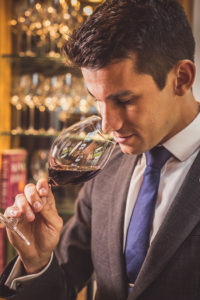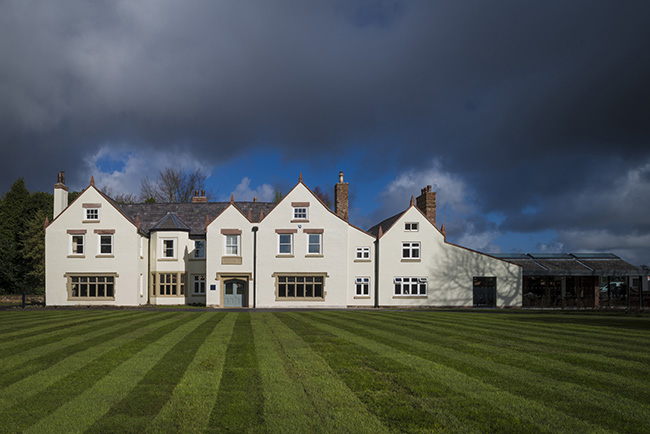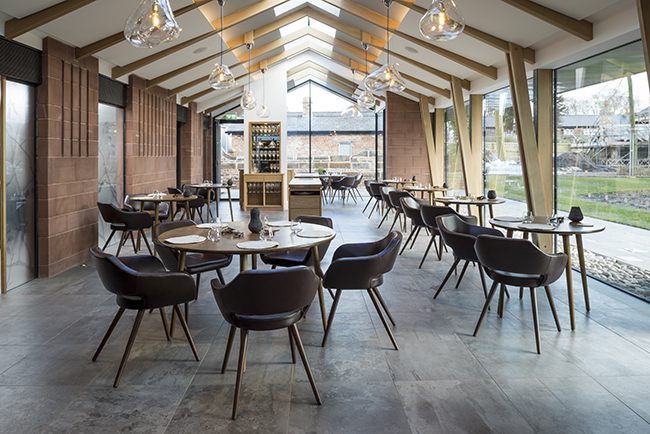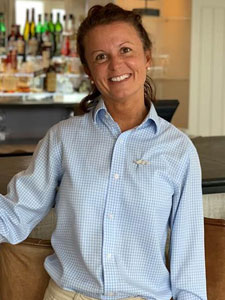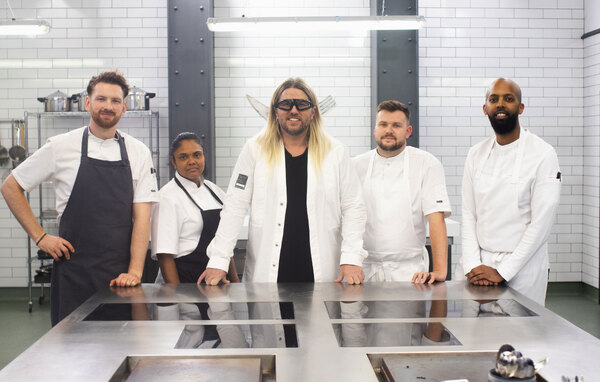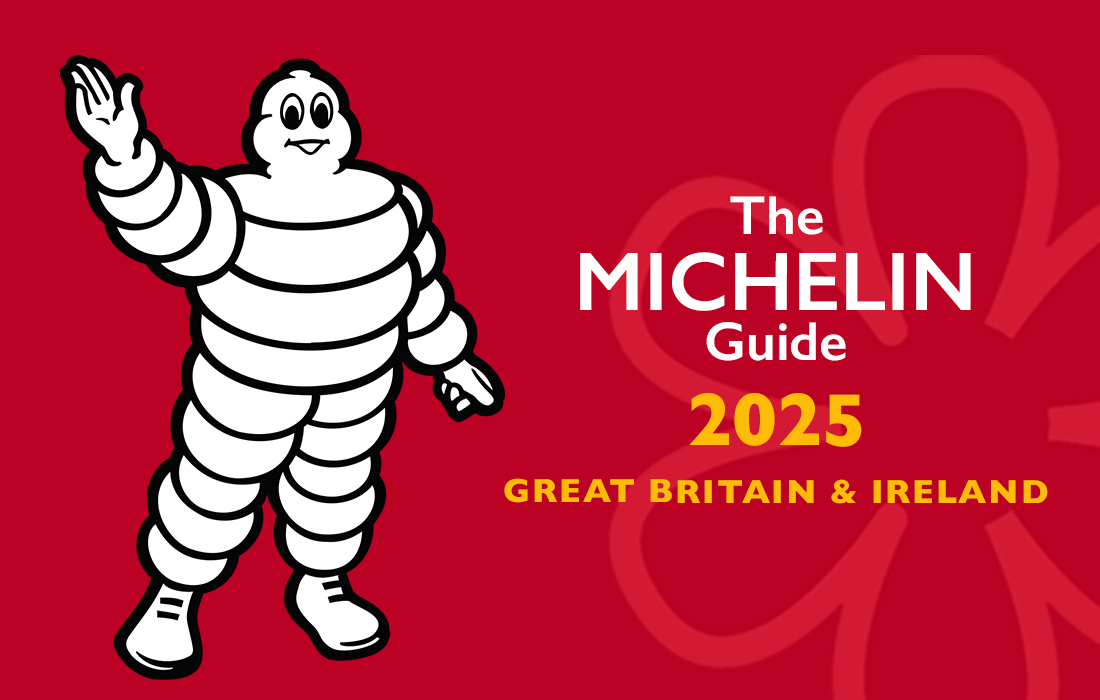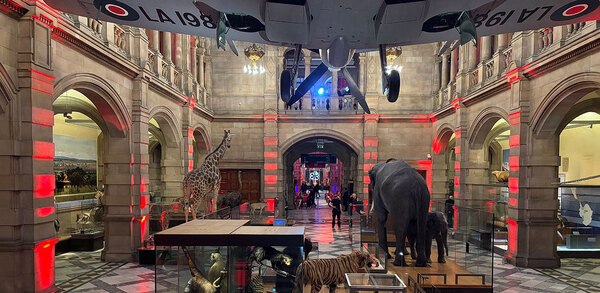The super sommelier: How a new breed of sommeliers like Moor Hall's Alex Freguin are smashing the stuffy stereotype
Forget the pompous Frenchman (and it was always a man) dressed in black with a silver tastevin dangling ritualistically around his neck, todayâs sommelier is a very different breed.
For starters, he or she â" and there are now many more shes â" might be sporting a tattoo. Theyâll have lots of Instagram followers. And instead of steering you towards an expensive bottle without first checking your budget, theyâll extract and impart information in a chatty, down-to-earth way, even sharing (when invited) entertaining stories of their travels in wine country.
We have to thank, in part, the economic crisis over a decade ago. Restaurants lost their starchiness as people watched their wallets. Then natural wine became a thing â" wine suddenly had a younger, hungrier audience, and natural wine was their way in.
By the time Netflix had rolled out its cult-hit documentary Somm in 2013 (which followed four sommeliers studying for the tough Master Sommelier exam), and its equally engaging sequels, the veil had well and truly dropped. Instead of being feared, sommeliers were revered, much like their celebrity chef counterparts â" cue the super sommelier.
So what is the role of the sommelier today? And have views really changed that much? âDefinitely,â replies Freguin. âThat old perception that we were drinking wine all day and talking rubbish to guests is long gone. Todayâs sommelier is much more humble. Itâs not about making yourself look better in front of the guests by using complex wine terms. We are there to make the dining experience better for the guest.â
Freguin has a few tricks up his sleeve on that score. âThere is a flexibility to what we do at Moor Hall. Our style of service has a twist, one that aims to put a smile on each customerâs face. Itâs about tweaking the formality â" we donât break the rules but we have a different interpretation of the rules,â he says.
âFor example, our chefs will come on to the floor to finish dishes at the table. I serve food too, which the sommelier traditionally doesnât do, but I think itâs more harmonious. And we have an open kitchen, too, which brings a more natural approach to our service.
âConsequently, we are more relaxed on the floor. For example, if we take a wine order, normally you would give the taste of the wine to the person who ordered it, but we like to offer that taster to everyone at the table.
âIn fact, I always offer guests the chance to try as many different wines as possible, because what it looks like on paper might not be what they expected in the mouth. This is typical of our more flexible approach â" itâs much less focused towards people who already know their wines. I always say that the most important thing is to know what you like â" it doesnât matter how much you know.â
Humility, it appears, is the number one quality Freguin is looking for in a sommelier. âThe sommelier is not there to look good â" they are there to make the guest look good. And they will have the right words to make the guest feel great, never patronising. But that person is not easy to find â" humility is something the younger generation can find hard to grasp,â warns Freguin.
He travels to different wine regions about twice a month, on his days off, courtesy mainly of obliging wine suppliers and producers. âI might return exhausted, but as soon as the first guest arrives Iâm the happiest person in the world, as Iâve just spent the last two days with a wine- maker in a beautiful place, drinking great wine and eating good food. Iâm so lucky to be able to do this as my job and I want guests to feel that.â
Another of Freguinâs smart moves is to often open bottles not officially available by the glass. âItâs about offering a generosity of approach. A customer might see a bottle on the list that they really want but they are driving so they donât order it [the whole bottle]. Then I offer them a glass of that wine and watch a big smile spread across their face. Every guest should feel unique â" do that and they are happy, and they will come back.â
Freguin wants to make his staff happy, too. âI want people to want to be here. Itâs a strong engagement. And that includes training for sommelier competitions as well â" itâs important for me to pass the baton and itâs beautiful watching them grow. Being a sommelier is a noble profession and Iâm very proud to do this,â finishes Freguin, before disappearing off for a jog. Regular jogs play a key part in his motivation. Super somm indeed.
Are you the next Sommelier of the Year?
Entries are now open for the Taittinger UK Sommelier of the Year 2019. Organised by The Caterer in partnership with the Academy of Food and Wine Service, the competition is open to professional sommeliers and waiting staff working in the UK.
Past winners include the late Gerard Basset, Ronan Sayburn and Xavier Rousset.
To enter, go online and answer in no more than 200 words why you are a sommelier, what your greatest wine experience has been to date and what winning would mean to you. This needs to be accompanied by a CV and nomination from your current employer by midnight on 11 March 2019.
Those that are successful will be invited to regional heats taking place in Manchester, Bristol and London on 26 April 2019.
Alex Freguin at a glance
Provence-born Freguin has come a long way in his 29 years. After dropping out of law school, he enrolled in the Ãcole Hôtelière de Provence, but was more interested in the work experience part than the classes, enjoying his time working at one-Michelin-starred Pierre Reboul in Aix-en-Provence, where the passion displayed by the sommelier there rubbed off. In 2011, he moved to Lyon as sommelier of Restaurant Eskis, then to Les Loges as head sommelier.
Then in 2014 he moved to the UK to work as a sommelier at LâEnclume in Cartmel, Cumbria, followed by Moor Hall, in Aughton, near Ormskirk, in 2016. He finally scooped the title of UK Sommelier of the Year in 2018, after reaching the final for the second time.
Moor Hall wine list â" the lowdown
Wines by the bottle 600
Wines by the glass 100
Focus 75% natural, organic and biodynamic
Selection Global
Freguinâs hot tips Vipava Valley in Slovenia; Elqui Valley in Chile; Burgenland in Austria. âThough, thereâs not a country that doesnât have something that excites me,â he says.
How other sommeliers view the role of the sommelier today
âIâve been at Idle Rocks for eight months now â" this is the first time the hotel has ever had a sommelier. I look after the wine list here, which is around 100 bins, plus I look after the shorter, more casual wine list at our sister property the St Mawes hotel.
âWe have found that our guests do want to communicate with someone knowledgeable about wine. And they want us to take care of their bottle, but in a much less formal way â" we donât need another table next to theirs to decant a bottle of wine. Customers also want to talk more about wine these days.
âThe sommelier is an aspirational role that our team really looks up to. Wine is such an exciting and interesting part of the restaurant business. The junior members of our team are also very interested in wine â" more than ever before, in fact. Our supervisors are all put on the Wine & Spirit Education Trust (WSET) courses, and we do wine training every week.
âBeing a sommelier offers such a special interaction with guests â" the relationship becomes much closer. The job offers a great opportunity to travel around the world, to meet the people behind the label and to sample some of the worldâs most exciting wines.â
Hans Larsson, head sommelier, Hide Above, Mayfair, London
âIâve been a sommelier for 10 years. I was part of the opening team at Hide. There are 18 sommeliers here in all, including two head sommeliers, of which I am one â" the biggest sommelier team in London, if not the country.
âWe have a 750-bin wine list at Hide and ready access to more than 6,000 wines from our wine boutique, Hedonism, so we get more than our fair share of wine lovers â" you have to be at the top of your game at Hide.
âThe role of the sommelier is more important now than ever before, especially the sommelier in an informal setting. It strips away the layers of old-school dining and it allows sommeliers to be more friendly and open, for their passion to shine â" itâs the way forward.
âOur guests have different expectations. Some want to chat about a wine producer for 20 minutes, others just want a small exchange, but the vast majority want some sort of conversation about wine.
âCombining restaurant manager with sommelier? Yes, absolutely. Thereâs a natural synergy there. Being a manager adds an extra layer of complexity to the role of sommelier.
âIt is a challenge to find the right people and weâre struggling like everyone else. But when we look for sommeliers, the most important thing for us is a willingness to learn â" thereâs no room for big egos.
âThereâs no other job quite like it. Being a sommelier means meeting people from so many different backgrounds and nationalities. You can travel pretty much everywhere and work anywhere â" you always have a friend in a wine region.â
âWhen we opened just over a year ago we started with a small, 50-bin, easily accessible wine list, because we didnât know the market here. Now we have 200 wines, with many more unusual selections, with an average sale price of £80 a bottle â" weâve even started doing wine flights.
âOur customers are a lot more knowledgeable about wine than we initially thought, especially since winning the Michelin star. Now we always need someone on the floor who can talk knowledgeably about wine. Thatâs me usually, but the rest of the staff are now able to confidently recommend wines.
âIt took us a while to find the right staff, but thereâs an eagerness to learn that wasnât there before, thanks to people like Michael Sager at east Londonâs Sager + Wilde, who has made it trendy to know about wine.
âIn fact, natural wine has done a lot to open up the subject to a whole new generation â" itâs an approachable gateway into the wine world and has done much to engage people. Once theyâre hooked, itâs down the rabbit hole they go.
âI think my role as manager and sommelier works to a certain extent, though Iâd rather not have to do the ordering, so Iâm currently training up staff to do that for me. Do we need sommeliers? Yes, 100%. It would be like having a head chef without a sous chef. It gives you an extra strength, and ultimately helps with your GP, driving more sales and better sales.â
âI look after the wine side of things at Deutsche Bank Victoria and Iâm also responsible for the wine list at Deutsche Bank in the City. As well as looking after the wine training for the staff and buying the wines for the list, Iâm on the floor as both a sommelier and a manager.
âOur private dining room operates much like any restaurant â" the only difference is that our clients drink far less at lunchtimes. But when they do drink wine, they choose off the list and ask the usual questions.
âOur list at Victoria is pretty concise â" 10 reds, 10 whites, four rosés, six sparkling wines and Champagnes, and two sweet wines. Itâs double the size for our City dining room. Itâs a busy job â" we change the stock every six months and itâs up to me what gets listed.
âIn the four years Iâve been selling wine, I have noticed a significant increase in questions from clients. Every year there is more interaction. Wine is a great way to engage with the client. Not only is it an important part of what we do â" offering excellent customer service â" a sommelier service is essential to the meal offering these days.
âCustomers want to know what theyâre putting in their mouths, from where the food comes from to who makes the wine. Iâve noticed more interest from my colleagues, too. A lot more of them want to do WSET courses. The courses are the key to all of this â" or it certainly was for me.
âI wasnât really interested in wine at catering college but after I was encouraged to study for my first WSET exam I found the course mind-blowing â" a whole new world opened up for me.â
âSwitched-on restaurants realise that a good sommelier can add a huge amount of value to a venue, regardless of how informal it is. Their role is not only to serve wine to guests but also to engage, which, in my experience, often leads to loyalty and repeat custom â" an increasingly rare phenomenon in the London dining scene today.
âAnd in such a highly competitive market, in which good food is almost a given these days, the role of front of house in delivering service is increasingly important. A good wine list and an emotionally astute sommelier is a vital part of that ecosystem.
âTo be honest, Iâm not sure guests are becoming more knowledgeable. Perhaps we think they are because they are armed with technology, such as the Vivino app, but in reality, guests actually end up cutting the corners of their own experience and bypassing human interaction by relying on a score to find a bottle that they will enjoy, which completely defeats the point of going to a restaurant. Wine is not just a product: it is a journey and a narrative and a huge part of the restaurant experience is transferring this knowledge to the guest.
âWhat has always inspired me as a sommelier is that it is a role that is both highly sociable and academic. Iâm not sure how many other careers straddle both areas so brilliantly.
âThe ability to travel and learn is both liberating and refreshing and of course the ability to taste and share with guests products that are effectively time capsules, never made the same, before or since, is such a special privilege.â
Are you the next Sommelier of the Year? >>
Minute on the clock: Luke Harbor, head sommelier at the Pig at Combe >>
Get The Caterer every week on your smartphone, tablet, or even in good old-fashioned hard copy (or all three!).



